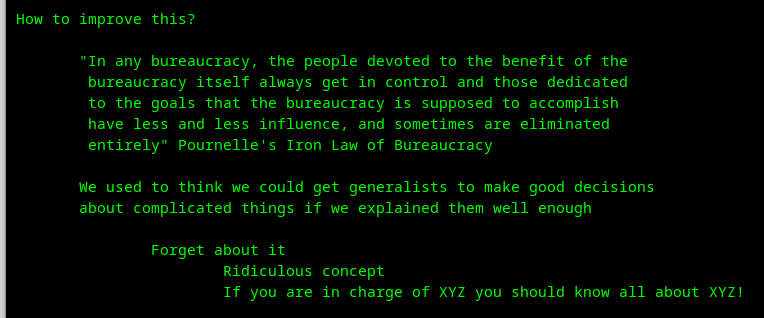bert hubert 🇺🇦🇪🇺🇺🇦
bert_hubert@eupolicy.socialFrom a presentation I'm preparing right now:
"European governments have mostly rejected having (OR LISTENING TO) in house reality-based expertise" - am I wrong? Are there countries doing better? The impression I get is that governments prefer consultants they can ignore when they give unfavourable advice, or make sure they only get favorable advice. #mazzucato
Walter van Holst
whvholst@eupolicy.social@bert_hubert It is more that having expertise is a career dead-end. There are roughly three viable career paths for civil servants in government:
- operational work: not well-paid, but very good benefits and typically lifetime employment;
- policy: still not well-paid, but you get to sit at tables where really important decisions are made. That said, you are supposed to rotate to a different policy area every four years or so and there is serious salary ceiling;
(1/2)
buherator
buheratorFrank
fschaap@mastodon.social@bert_hubert Also the underlying reason why government fails at developing (and maintaining) its own software. It cannot see the means of production as essential to its operation... which begs the question, what in fact does government see as its core product?
bert hubert 🇺🇦🇪🇺🇺🇦
bert_hubert@eupolicy.social@aart you’d be in the not mostly part for sure!
circl
circl@social.circl.lu@bert_hubert The expertise exists within many European governments but does it reach where it's needed when so many factors are in play?
bert hubert 🇺🇦🇪🇺🇺🇦
bert_hubert@eupolicy.socialI'm radicalizing on this: "If you are in charge of XYZ you should know a lot about XYZ!"
Walter van Holst
whvholst@eupolicy.social@bert_hubert Pournelle Was a bit a libertarian asshole. He was not always wrong, mind you.
Aristotelis Tzafalias
aristot73@infosec.exchange@bert_hubert one caveat: thinking that you know everything can be worse than knowing nothing. Understanding, listening and learning are imo superior traits to raw personal expertise. Individual experts can be wrong and often are.
bert hubert 🇺🇦🇪🇺🇺🇦
bert_hubert@eupolicy.social@aristot73 I've yet to see proof that the generalists do better though. Most companies led by generalists do not innovate & leave most of the real work to other places. Which also means they can't innovate. A generalist can mind the shop perhaps.
Aristotelis Tzafalias
aristot73@infosec.exchange@bert_hubert tbh, was thinking more about public sector
Smeele, A.P.M. (Ton) has moved
tsmeele@social.edu.nl@bert_hubert i dont think government deliberately ignores inhouse advice, yet the C-level selling of commercial companies combined with high percentage of insourced consultancy (due to budget cuts and an outsiurcing strategy) weakens the internal expertise voice.
Smeele, A.P.M. (Ton) has moved
tsmeele@social.edu.nl@bert_hubert for instance, universities that used to successfully run a full stack of services inhouse for ten thousands of staff and students less than 10 years ago, no longer trust themselves to run e.g. standard course management services in house, they are concerned about being able to *maintain* the level of expertise, even if currently still present. As interesting IT projects (innovation) get outsourced, these management fears actually become self fulfilling prophecy.
bert hubert 🇺🇦🇪🇺🇺🇦
bert_hubert@eupolicy.socialJustin Scholz
jmovs@mastodon.social@bert_hubert we hear so much about „decluttering bureaucracy” and so on. If you reduce bureaucracy, you necessarily remove institutionalised specific learnings. Every bit of bureaucracy exists for a reason. Cutting it without understanding what this means or worse, trying to cut while trying to maintain the same results is futile. The discussion shouldn’t ever be on bureaucracy, it should be about the desired outcomes. Only then can you figure out what changes to bureaucracy are needed.
Justin Scholz
jmovs@mastodon.social@bert_hubert I would even go so far that politicians who claim to „cut red tape and bureaucracy“ are either naive or very sinister in using that as a populist idea to push unpopular policies in the interest of „reducing bureaucracy“
AkaSci 🛰️
AkaSci@fosstodon.org@bert_hubert
As we all know, self-preservation and self-interest are strong drivers of behavior.
How can we bring about change so that self-interest and public-interest are better aligned?
Gabriel Adrian Samfira
gabriel@mastodon.samfira.com@bert_hubert @aristot73 imo a generalist knows enough to know when to defer to an expert. Try building a public/private cloud without a generalist that understands the big picture and coordinates teams of network engineers, security experts, sys admins, development teams that create the various SaaS/PaaS, that can interact with the beneficiary of those systems and translate those needs into actual products.
Experts are essential. But to a hammer, everything is a nail. You need both.
wyngman
tasket@infosec.exchange@gabriel @bert_hubert @aristot73 Yes, and I also don't remember getting the memo that said generalists = know-it-alls.
